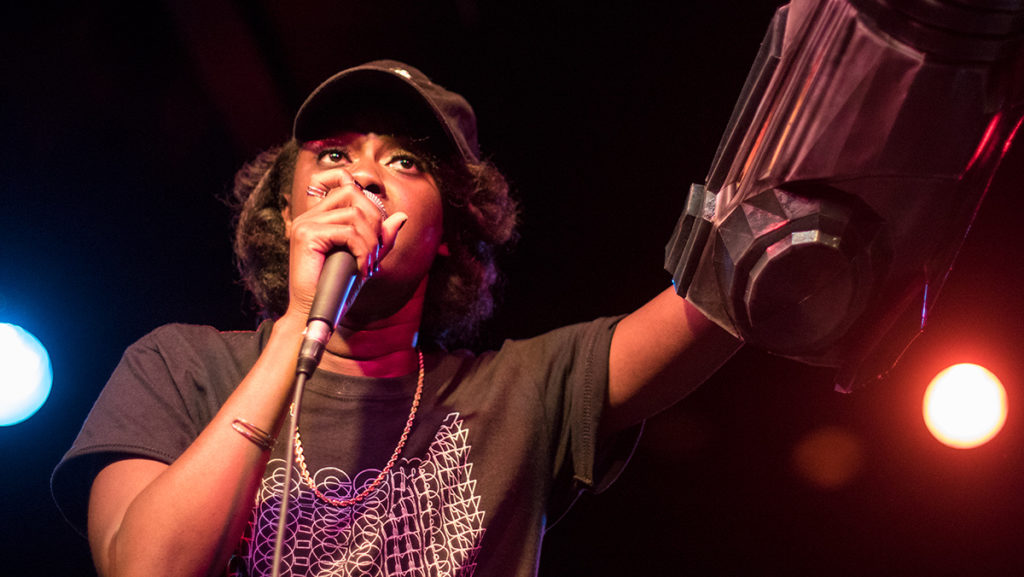The term “nerd,” when used derogatorily, is meant to alienate, but intellectuals meeting at Ithaca College are using it to unite, challenge and empower.
On April 21 and 22, avid pop culture fans and self-proclaimed nerds will meet for the fourth biennial Pippi to Ripley conference to discuss gender, race and sexuality as represented in fantasy, science fiction and comics.
Pippi to Ripley, named after the fantasy characters Pippi Longstocking and Ellen Ripley, will be multifaceted and will include a number of panels for college community members and the general public. The series will also feature a performance and panel by Ithaca-native rap artist Enongo Lumumba-Kasongo, also known by her stage name, Sammus, on April 21 in the Emerson Suites. The concert is $3 for students and $5 for the general public, and proceeds will go to Planned Parenthood and the Advocacy Center. All events are open to the public.
Katharine Kittredge, professor in the School of Humanities and Sciences, teaches courses that focus on feminism in literature and science fiction, such as Girlhoods in Literature, DIY SciFi and Feminist Fictions. She co-organized the first Pippi to Ripley conference in 2011 with English associate professor Elizabeth Bleicher, after coming up with the idea with students. Kittredge’s class, Advanced Studies in Feminist Science Fiction, centers upon planning and preparing talks for this event.
Kittredge said the majority of the class includes workshopping papers to be presented in the form of panels. The students also took part in selecting and revising the papers to be presented at this conference.
“This is very much their conference,” Kittredge said.
Senior Alyssa Rodriguez, a student in Kittredge’s class, will be delivering a presentation titled “Play Like a Girl: Finding Space for Girl Gamers in Ready Player One.” The presentation will discuss the characterizations of female gamers in the novel “Ready Player One” by Ernest Cline.
“My research specifically is focusing how the spaces for girl gamers are very reductive, and your only choices are to be either amazing and really hot, and essentially you could become the main character’s girlfriend, or you could become the love interest,” Rodriguez said. “It’s more acceptable to be a gamer girlfriend rather than a gamer girl … or, just completely erase all of your feminine identity and play as a white dude.”
Rodriguez has also been working with three high school students from the Lehman Alternative Community School on presentations they will give at Pippi to Ripley. Rodriguez said this year is going to be the first year high schoolers are involved.
Kittredge said Pippi to Ripley has always stood out from other academic conferences because it integrates students and professors of all ages. Typically, she said, academic conferences are exclusive, catering solely toward graduate students, undergraduate students or professors.
“We think it’s really important to have different generations mixing and people from different levels getting together and exchanging information,” Kittredge said. “It allows people who are further along to mentor up–and–coming people, and it also introduces ideas more established scholars might not be entertaining.”
Sammus performance is a new addition to Pippi to Ripley. The artist said she’s looking forward to the performance because it spotlights female reproductive resources.
“I really hope people will come to the show, because it’s actually a fundraiser for Planned Parenthood,” Lumumba-Kasongo said. “And I’m sure that folks who have been paying attention to the news know that the Trump administration is basically putting a bull’s-eye on Planned Parenthood and is actually giving the go-ahead for states to defund this critical resource for women.”
Lumumba-Kasongo will also appear as a keynote speaker the following day and will take part in moderating a panel called “Black and Geeky: A Conversation About Nerdcore, Race and Representation.” Sammus is often categorized as nerdcore, as many of her songs discuss social issues through the lens of gaming and science fiction — subcultures she is involved in. She said she had a complicated relationship with that label and that she plans to include the issue in the panel discussion along with broader topics of representation in technology and media.
“You don’t see a lot of darker-skinned women in games, cartoons, comic books — those kinds of things,” she said. “And by that same token, physical attributes: You don’t see broader noses. You don’t see curlier hair textures. … I think in that regard, we just sort of see the same kind of body types that often feel like they’re catering to a straight male gaze.”
The purpose of Pippi to Ripley is not only to bring people together through common interests but to also encourage people to practice media literacy, even if it means analyzing and criticizing one’s favorite fandoms, Rodriguez said.
“It’s OK and actually good to be critical of the things you love,” Rodriguez said.
Kittredge said believable characters should be more present in media, challenging typical, heteronormative tropes.
“It just feels like a lot of times, we’re seeing the same very small range of people presented to us and told we’re supposed to identify with them and imagine ourselves in those situations,” Kittredge said. “Especially when we’re talking about fantasy, the sky should be the limit.”














